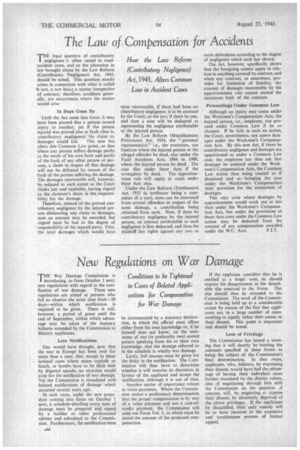The Law of ,Compensation or Accidents
Page 46

If you've noticed an error in this article please click here to report it so we can fix it.
How the Law Reform (Contributory Negligence) Act, 1945, Alters Common Law in Accident Cases 'nE legAti question of contributory egligence it often raised in roadaccident cases, and so the alteration in law brought about by the Law Reform (Contributory Negligence) Act, 1945, should be noted. This question mostly arises in connection with what is called % tort, a tort being a matter irrespective of contract; therefore, accidents generally, are occurrences where the matter would arise
In Days Gone By Until the Act came into force, it may have been proved that a person caused injury to another, yet if the person injured was proved also at fault (that is, contributory negligence) his claim to damages would fail. This new Act alters this Common Law point, so that where any person suffers damage partly as the result of his own fault and partly of the fault of any other person or persons, a claim in respect of that damage will not be defeated by reason of the fault of the person suffering the damage. . The damages recoverable will, however, be reduced to such extent as the Court thinks just and equitable, having regard to the claimant's share in the responsibility for the damage.
Therefore, instead of the proved contributory negligence by the injured person eliminating any claim to damages, now an amount may be awarded, but regard must be had to the degree of responsibility of the injured party. First, the total damages which would have oeen recoverable, if there had been no amtributory negligence, is to be assessed by the Court, or the jury if there be one, and then a sum will be deducted as representing the negligence attributable to the injured person.
By the Law Reform (Miscellaneous Provisions) Act, 1934, the "personal representative," i.e., the executors, can function where the injured person or the alleged offender be dead, also under the Fatal Accidents Acts, 1846 to 1908, where the injured person be dead. The case dies under these Acts if the wrongdoer be dead. The apportionment rule will apply to cases under these Acts also.
Under the Law Reform (Tortfeasors) Act, 1935 (a tortfeasor being a committer of a tort), sums can be recovered from several offenders in respect of the same damage, a contribution being obtained from each. Now, if there be contributory negligence by the injured person, an amount attributable to such negligence is first deducted, and then the plaintiff has rights against any two or
more defendants according to the degree of negligence which each has shown.
The Act, however, specifically shows that the foregoing cannot apply in relation to anything covered by contract, and when any contract, or enactment, provides for limitation of liability, the amount of damages recoverable by the apportionment rule cannot exceed the maximum limit of the contract.
Proceedings Under Common Law
Although an injury may come under the Workmen's Compensation Acts, the injured person, i.e., employee, can proceed under Common Law if he so chooses. If he fails in such an action, the Court, nevertheless, can assess dam ages under the Workmen's Compensation Acts. By this new Act, if there be contributory negligence and damages are apportioned as under a Common Law case, the employee can then ask that damages be assessed under the Work • men's Compensation Acts, the Common Law action then being treated as if dismissed and so bringing the case under the Workmen's Compensation Acts' provision for the assessment of damages.
This may arise where damages by apportionment would work out at less than under the Workmen's Compensa tion Acts, but under the provisions of those Acts costs under the Common Law action may be deducted from the amount of any compensation awarded under the W.C. Acts. F.J.T.




































































